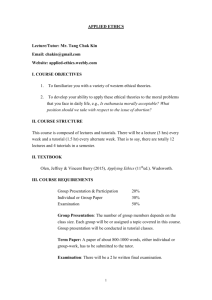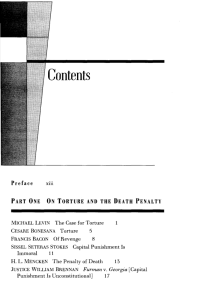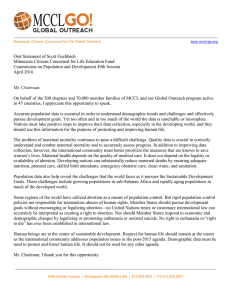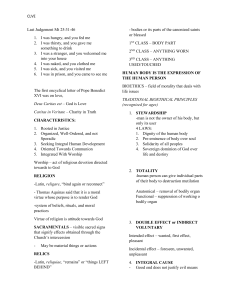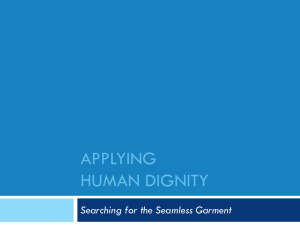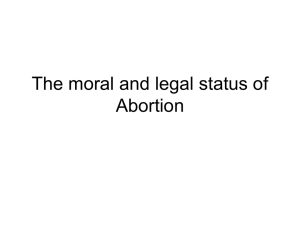Introduction to Law - Moral Debate Activities
advertisement
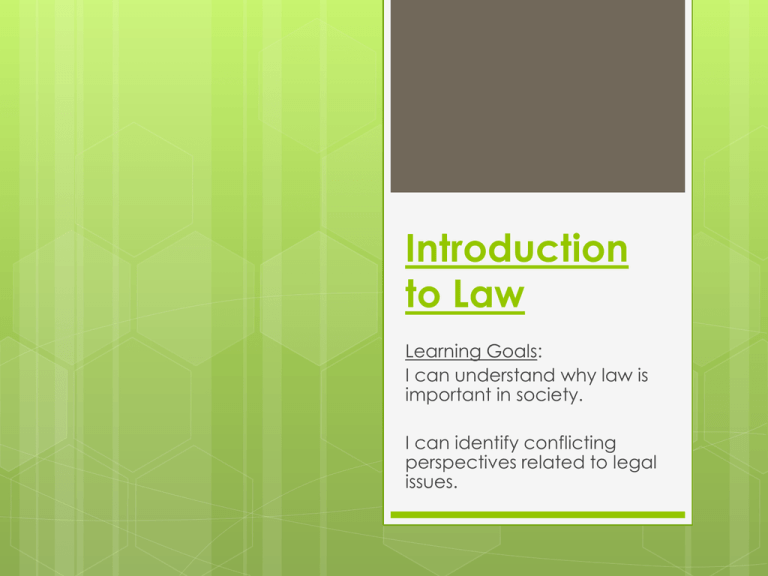
Introduction to Law Learning Goals: I can understand why law is important in society. I can identify conflicting perspectives related to legal issues. Rules v. Laws: Breaking rules can result in a penalty but are not enforced by the police and courts You can opt out of many rules. You cannot opt out of laws or change laws on your own If you break a law and are caught, you face punishment – What if you are not caught? Is it still a crime? What is Law?: Laws regulate our social, political and economic activities Laws can differ between nations, provinces and cities Some argue that law is whatever the government says it is. Others argue law is merely a social necessity to help society function by reason and fairness not brute force Each generation influences the system and the laws that are passes reflect the society of that period For example: 1960s and 1970s – first national divorce laws, prison reform emphasizing rehabilitation 1982 – enactment of Charter of Rights and Freedoms to guarantee the rights of all Canadians regardless of age, race, gender, religion… Law in Our Lives: Canada’s legal system represents principles Canadian’s believe in and value It is important to study law to ensure that the legal system continues working - influenced by thoughtful, informed citizens who can affect meaningful change Law is the study of people, how they behave, what they value and how they solve problems The Need for Law: Laws create predictability and structure for a peaceful and safe society Laws protect the rights of individual citizens, including and especially against the government Definitions Norms - A standard or pattern, especially of social behavior, that is typical or expected of a group Values - The moral principles and beliefs or accepted standards of a person or social group Law – a rule to govern action; a rule of conduct established by government, for society to follow and obey. What impacts our values and norms? Religion Education Property Family Society Political system Rule of Law: Three-part 1. 2. 3. principle of justice Individuals recognize laws are necessary to regulate society Law applies equally to everyone, including heads of state, police, and politicians No one can exercise unrestricted power to take away rights except in agreement with the law Toronto Mayor – Rob Ford Rule of Law: Background on the case: http://www.cbc.ca/news/canada/toronto/story/2012/11/25 /toronto-ford-conflict-case-decision-release.html http://www.globalnews.ca/rob+ford+found+guilty+in+confli ct+of+interest+case+plans+to+appeal/6442760375/story.ht ml What has happened recently? http://news.nationalpost.com/2013/01/25/rob-ford-toremain-torontos-mayor-as-court-overturns-ruling-orderinghim-out/ http://www.globalnews.ca/live+coverage/6442795708/sto ry.html Characteristics of Justice: A law is unjust if it discriminates using irrelevant characteristics – (such as...?) Law should be impartial, regardless of a person’s position or financial status Laws must be just and have some relationship to society’s values and beliefs Law and Morality: Some laws are practical (ex. property rights, traffic). Other laws reflect the values of the majority of society (ex. euthanasia, child pornography, spanking) Anytime laws reflect moral values and beliefs, there will be controversy Activity – Moral Judgment: Case 1: Sue Rodriguez – Euthanasia/Assisted-Suicide Law (Group Discussion) Case 2 – ‘Matter of Life and Death’ – Abortion Law (Individual Response) Post Activity Questions for Discussion: Why is Euthanasia against the Federal Criminal Code, but Abortion is not? Abortion was not always legal in Canada. Why do you think they changed that law? Abortion and Euthanasia are controversial laws based on differences of morality. What perspectives do you think exist on these topics? What do you think are their reasons for their perspective?
